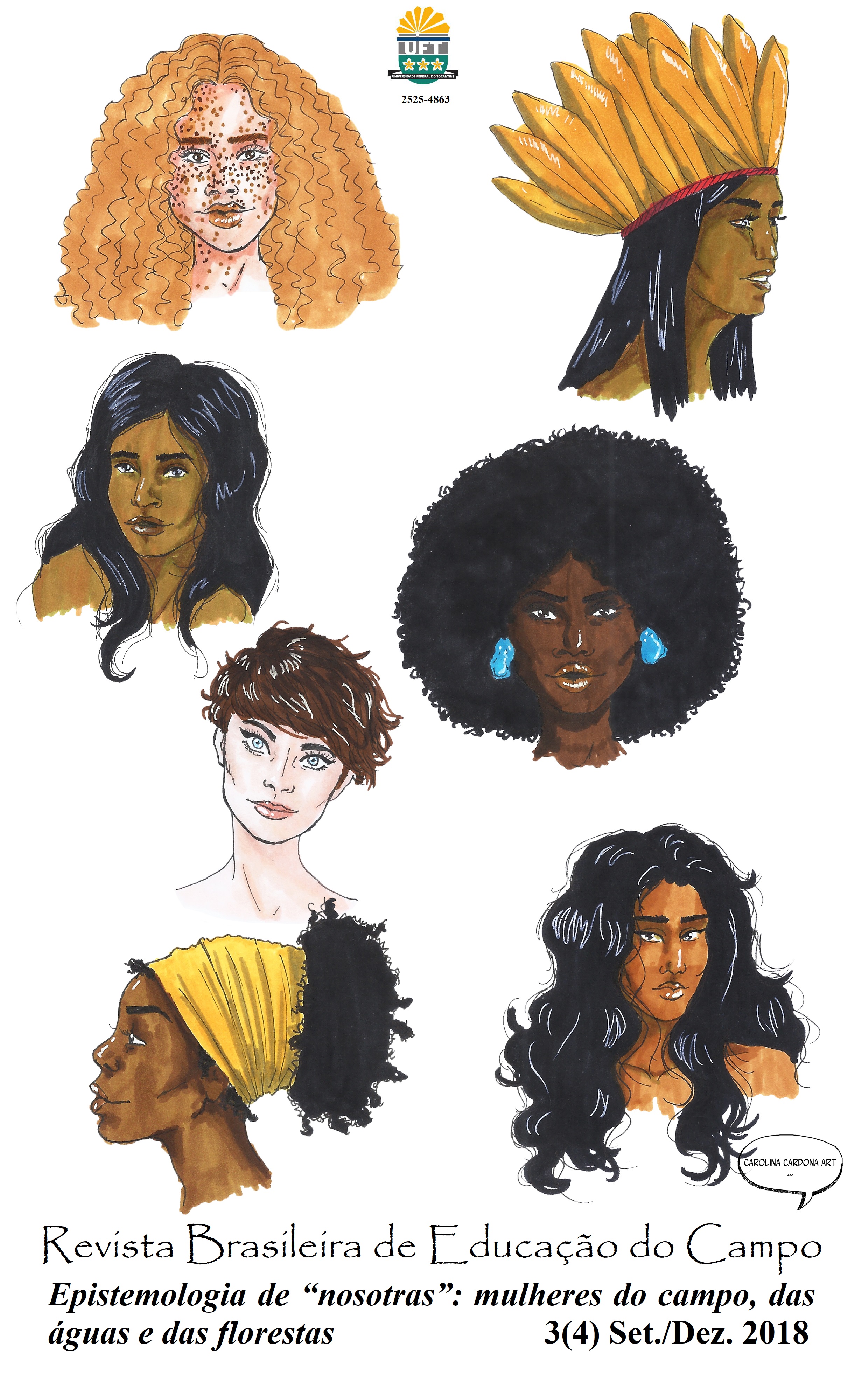Writing of peasants students on sense of pedagogical practice in rural schools
DOI:
https://doi.org/10.20873/uft.2525-4863.2018v3n4p1294Abstract
ABSTRACT. The objective of this article is to understand the different social voices (speeches) that permeate the representations of these women about the pedagogical practice in rural schools. The working hypothesis is that these representations show the relationship of the course proposal with other social spheres that potentiate or challenge the theoretical, methodological and political configuration of the course itself, if taken as an object of problematizations. For the analysis of excerpts extracted from the reports we base ourselves theoretically on the socio-historical perspective of language formulated by Bakhtin and his Circle, in addition to theoretical foundations produced in the field of studies of the Rural Education. As an analytical result, we identify a strong presence of discourses in the reports of learners in Internship situations: (i) for the pedagogical "how to" of educators in rural schools; (ii) for the conflictive relationship between scholarly knowledge and this discursive regularity leads us to conclude, tentatively, that the discourses of the subjects in formation produced in the alternation of formative times indicate the challenges and potentialities of an educational proposal open to the multiplicity of voices that are at the base of the course proposal itself.
Downloads
References
Antunes-Rocha, M. I. (2010). Licenciatura em educação do campo. In Oliveira, D. A., Duarte, A. M. C., & Vieira, L. M. F. (Orgs.) Dicionário: trabalho, profissão e condição docente. Belo Horizonte: UFMG/Faculdade de Educação. CDROM.
Arroyo, M. G. (1999). A educação básica e o movimento social do campo. In _____, Fernandes, B. M. (Org.). A Educação Básica e o Movimento Social do Campo (pp. 10-38). Brasília, DF: Articulação Nacional Por Uma Educação Básica do Campo.
Bakhtin, M. (V. N. Volochínov). (2006). Marxismo e Filosofia da Linguagem. 12. Ed. São Paulo: Hucitec.
Caldart, R. S. (2011). Licenciatura em Educação do Campo e projeto formativo: qual o lugar da docência por área. In ____ (Org.). Caminhos para transformação da escola: reflexões desde práticas da Licenciatura em Educação do Campo (pp. 127-154). São Paulo: Expressão Popular.
_____. (2009). Educação do Campo: notas para uma análise de percurso. Trabalho, Educação e Saúde, (7), 35-64.
Caregnato, R. C. A., & Mutti, R. (2006). Pesquisa qualitativa: análise de discurso versus análise de conteúdo. Texto Contexto Enferm, 679-684. Recuperado de: http://www.scielo.br/pdf/tce/v15n4/v15n4a17 Acesso em 03 de março de 2017.
Costa, E. M., & Monteiro, A. L. (2012). Procampo: uma política de formação inicial para o docente do campo. In Anais XVI ENDIPE - Encontro Nacional de Didática e Práticas de Ensino. UNICAMP - Campinas.
Freire, P. (2005). Pedagogia do Oprimido. 17. ed. Rio de Janeiro: Paz e Terra.
_____. (1981). Ação Cultural para a liberdade e outros escritos. Rio de Janeiro: Paz e Terra.
Freitas, M. T. (2003). A perspectiva sócio-histórica: uma visão humana da construção do conhecimento. In Freitas, M. T., Jobim, S. S., & Kramer, S. (Orgs.) Ciências humanas e pesquisa: leitura de Mikhail Bakhtin (pp. 26-38). São Paulo, Cortez.
Molina, M. C., & Sá, L. M. (2010). A Licenciatura em Educação do Campo da Universidade de Brasília: Estratégias Político-Pedagógicas na Formação de Educadores do Campo. In Molina, M. C., & Sá, L. M. S. (Orgs.). Licenciaturas em Educação do campo: Registros e reflexões a partir das experiências Piloto (pp. 35-62). Belo Horizonte: Autêntica Editora.
_____. (2015). A educação do campo e o enfrentamento das tendências das atuais políticas públicas. Educação em Perspectiva, (6) 2, 378-400.
Ramos, M. (2012). Escola Unitária. In Caldart, R. S., et. al. (Orgs.). Dicionário da Educação do Campo (pp. 343-349). São Paulo: Escola Politécnica de Saúde Joaquim Venâncio, Expressão Popular.
Silva, I. S., Souza, H., & Ribeiro, N. B. (2014). Apresentação. In _____. (Orgs.). Práticas contra-hegemônicas na formação de educadores: reflexões a partir do curso de Licenciatura em Educação do Campo do Sul e sudeste do Pará (pp. 11-19). Brasília: MDA.
Silva, M. A. (2012). A fetichização do livro didático no Brasil. Educ. Real., 37(3), 803-821, Recuperado de: http://www.scielo.br/pdf/edreal/v37n3/06.pdf. Acesso em: 07 de julho de 2017
Unifesspa. (2014). Projeto Pedagógico do Curso de Licenciatura em Educação do Campo, Marabá.
Published
How to Cite
Issue
Section
License
Proposal for Copyright Notice Creative Commons
1. Policy Proposal to Open Access Journals
Authors who publish with this journal agree to the following terms:
A. Authors retain copyright and grant the journal right of first publication with the work simultaneously licensed under the Creative Commons Attribution License that allows sharing the work with recognition of its initial publication in this journal.
B. Authors are able to take on additional contracts separately, non-exclusive distribution of the version of the paper published in this journal (ex .: publish in institutional repository or as a book), with an acknowledgment of its initial publication in this journal.
C. Authors are permitted and encouraged to post their work online (eg .: in institutional repositories or on their website) at any point before or during the editorial process, as it can lead to productive exchanges, as well as increase the impact and the citation of published work (See the Effect of Open Access).















